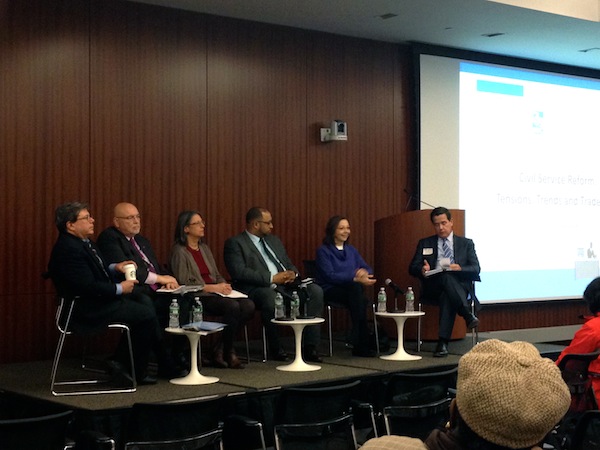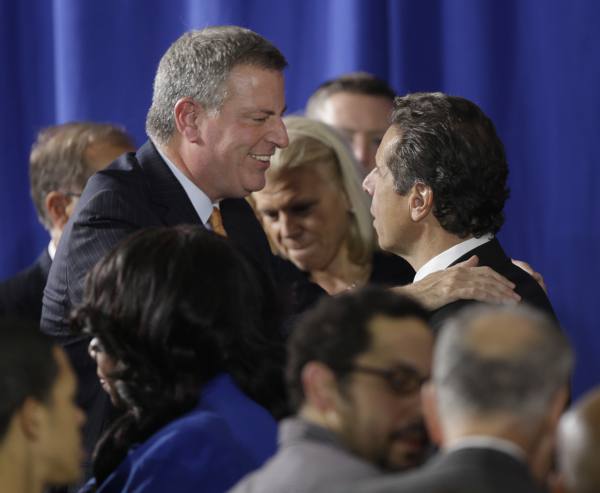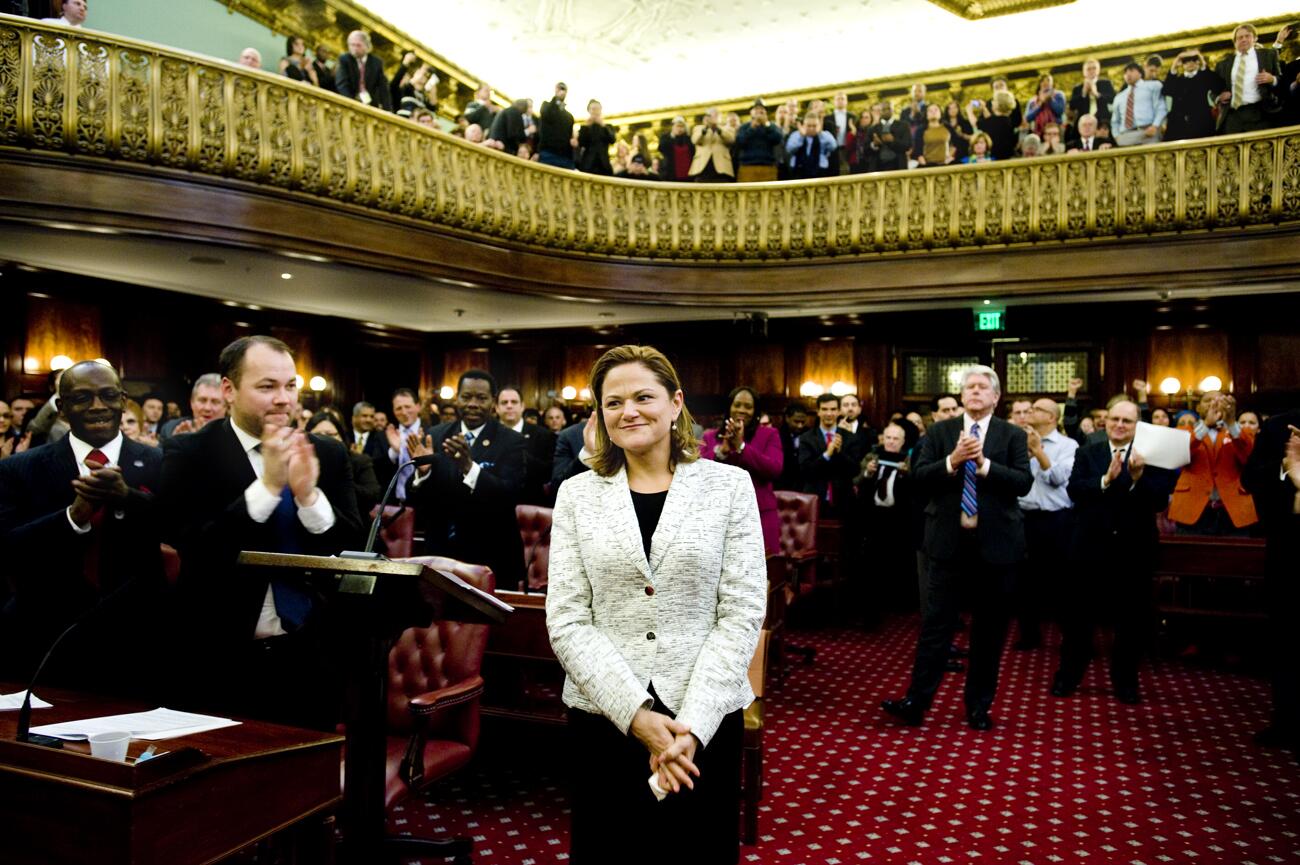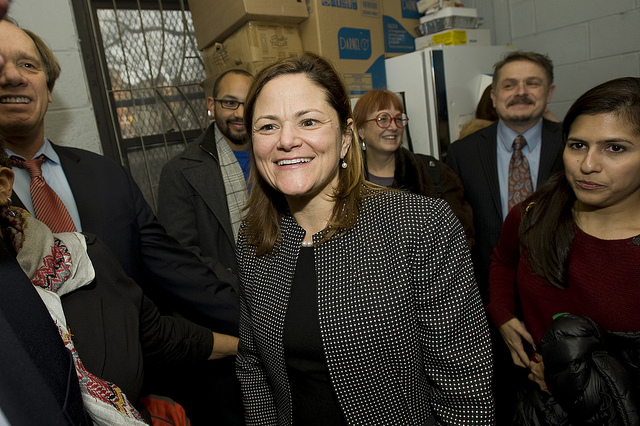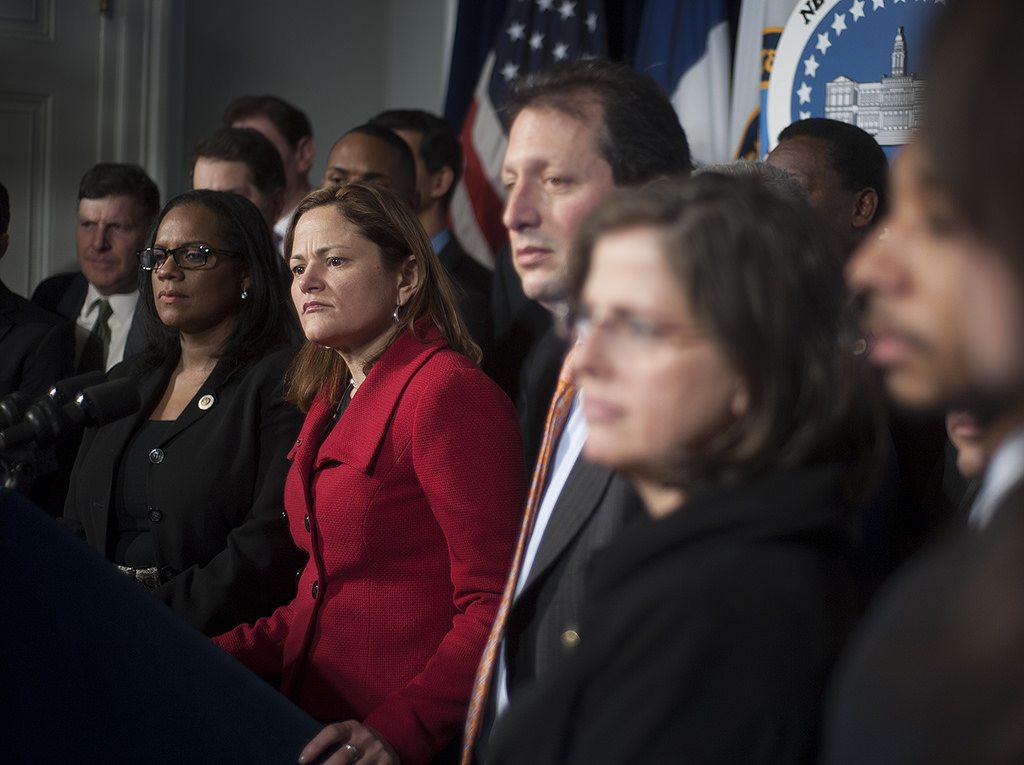
Engaging in the political tradition of rewarding friends and punishing foes, City Council Speaker Melissa Mark-Viverito last week doled out coveted committee chairmanships and leadership roles – and the $390,000 in stipends for the positions.
With 44 committees and subcommittees, some Council members are spread across as many as seven panels.
Kenneth Sherrill, a Hunter College professor emeritus of political science, counts himself among those who suggest that committee overload is counterproductive to good governance.
"You want committee members to become specialists in the areas over which the committee has jurisdiction," he said. "This is critical to the oversight function, yet specialization is almost impossible with the proliferation of committees."
The committee appointments come after a heated race for speaker, one that effectively shifted political clout typically wielded by county bosses. Mark-Viverito's win — boosted by a Brooklyn coalition and a Progressive bloc — paid dividends for her allies. Sixteen committee chairmanships went to her Brooklyn supporters, including the vaunted Land Use Committee now under Councilman David Greenfield.
Another major post, Finance Committee chairman, went to Queens Councilwoman Julissa Ferreras, who bucked her county leadership to support her fellow Progressive Caucus member.
The same can be said of new Councilman Ritchie Torres of the Bronx, an early supporter of Mark-Viverito who also broke away the now weakened Bronx Democratic leadership. Torres landed a deputy leader spot — one of seven — and chairmanship of the Public Housing Committee.
He and 18 other freshmen quickly moved up the ranks to committee chairs, including Bronx Councilwoman Vanessa Gibson to the Public Safety Committee, Manhattan Councilman Ben Kallos to the Government Operations Committee and Corey Johnson of Manhattan to the Health Committee.
Mark-Viverito, who fended off members' concerns about racial diversity after the appointments were announced, also included former speaker rivals James Vacca and Dan Garodnick to leadership spots, joining Torres as deputy leaders. There are 21 black, latino and Asian Council members serving as chairs. Five of the six LGBT Council members are also in charge of committees. There are 12 women in leadership positions, with two noticeable exceptions.
Rosie Mendez of Manhattan formerly served as chair of Public Housing, and Bronx Councilwoman Annabel Palma lost her chairmanship of the General Welfare Committee. The only other two members without a chairmanship were Andy King of the Bronx and Rory Lancman of Queens.
Palma's loss is particularly seen as a political slight. A last-minute hold-out for Garodnick ahead of the vote that installed Mark-Viverito as speaker, Palma was the only former speaker candidate denied a committee chair. She remains on the General Welfare Committee, as well as on five other committees.
While most members are serving on between five or six cmmittees, Brooklyn Councilman Steve Levin is serving on seven, replacing Palma as chair of the General Welfare Committee. Also serving on seven different committees are: Peter Koo, Karen Koslowitz and Donovan Richards of Queens; Rafael Espinal, Jumaane Williams, Antonio Reynoso and Inez Barron of Brooklyn; and Torres of the Bronx. Counting Garodnick's appointment to a land use subcommittee, he technically sits on eight panels.
Members get a stipend for chairing a committee, but not for serving on one. Nonetheless, Sherrill questions the motivation behind having so many committees and chairpersons. Each member already receives $112,500 in a yearly salary.Committee leadership comes with perks in the form of stipends, or lulus. The smallest lulus are $8,000; the largest goes to the speaker, who gets $25,000.
"Certainly, when almost every member chairs a committee or subcommittee, you wonder about how often committees or subcommittees are created for the purpose on enhancing members' standards of living," Sherrill said.
Click on individal committees below to review their activities and their newest members:
{slidetoggle=Committee on Aging}One of the Council's low-profile committees, it's charged with responding to the needs of the city's growing senior population. The most recent bill passed by the committee occurred in 2010 and created an alert program to help locate missing seniors with cognitive impairments. The committee has, however, played a part in preserving and restoring budget cuts to senior programs.
Margaret Chin, Chair | Stipend: $8,000
Arroyo, Koslowitz, Rose, Deutsch, Treyger, Vallone (Subcommittee on Senior Centers chair){/slidetoggle}
{slidetoggle=Committee on Civil Rights}The committee recently made headlines for its hearings on "stop and frisk," and for passing two bills last year. One of the laws bans employment discrimination against pregnant women and new mothers. The committee also championed a controversial bill banning discrimination due to unemployment status, which was adopted after the Council overrode a veto by Mayor Michael Bloomberg.
Darlene Mealy, Chair | Stipend: $8,000
Eugene, Dromm, Rose, King{/slidetoggle}
{slidetoggle=Committee on Civil Service and Labor}The first committee to introduce legislation under the new Council. Last session's iteration passed the long-debated paid sick leave legislation, approved after years of negotiations that resulted in a compromised bill. The new proposal would mostly restore the bill to what it looked like before former Speaker Christine Quinn released the watered-down version last March.
I. Daneek Miller, Chair | Stipend: $8,000
Crowley, Dromm, Constantinides, Cornegy{/slidetoggle}
{slidetoggle=Committee on Community Development}In the past term, the committee passed a single bill: a law requiring the mayor to submit an annual report on poverty. Enacted days before Bill de Blasio was inaugurated, it presciently set the tone for the relationship between the new Council and a mayor promising to eliminate the "Tale of Two Cities."
Maria del Carmen Arroyo, Chair | Stipend: $8,000
Palma, Crowley, King, Gibson, Maisel, Rosenthal{/slidetoggle}
{slidetoggle=Committee on Consumer Affairs}The previous incarnation of the committee was a busy one: it passed 27 bills in Quinn's final term as speaker. Among the legislation enacted were various bills on sidewalk vending — including the reduction of maximum fines for vending violations — as well as the famous brunch bill.
Rafael Espinal, Chair | Stipend: $8,000
Gentile, Ferreras, Koslowitz, Lancman{/slidetoggle}
{slidetoggle=Committee on Contracts}It collaborates with city agencies on reviews of city procurement policies and procedures. It also oversees government and Mayor's Office contracts. Recent legislation includes a landmark living wage law applying to workers on development projects receiving subsidies from the city — which the previous administration took to court and lost last year.
Helen Rosenthal, Chair | Stipend: $8,000
Koo, Wills, Constantinides, Deutsch, Johnson, Miller{/slidetoggle}
{slidetoggle=Committee on Cultural Affairs, Libraries and International Intergroup Relations}The committee recently passed a bill requiring some agencies to promote library cards. Yet the committee had an important role in during the oft-frustrating budget dance between the mayor and Council, since libraries were usually one of the first items to be cut. The new Council is largely committed to avoiding that dance given its new political ally in Gracie Mansion.
Jimmy Van Bramer, Chair | Stipend: $20,000
Crowley, Ferreras, Koo, Levin, King, Constantinides (Subcommittee on Libraries chair), Cumbo, Rosenthal{/slidetoggle}
{slidetoggle=Committee on Economic Development}Tasked with working with the city's Economic Development Corporation and administration's Department of Small Business Services, the committee was quiet on the legislative front last session. Nonetheless, the committee will likely continue addressing workforce development issues and looking at the impact of city-subsidized projects.
Dan Garodnick, Chair | Stipend: $15,000
Gentile, Ferreras, Koslowitz, Weprin, Wills, Richards, Barron, Miller{/slidetoggle}
{slidetoggle=Committee on Education}The committee passed numerous bills during the last session — including new legislation to track arts education funding — but the number of laws passed belies the role the committee plays in the city's ongoing conversation on education. The new crop of committee members will likely collaborate with the administration on any number of reforms, including pre-K expansion, testing reform and a diversified curriculum.
Daniel Dromm, Chair | Stipend: $8,000
Gentile, Garodnick, Chin, Levin, Rose, Weprin, Williams, King, Barron, Deutsch (Subcommittee on Non-Public Schools chair), Levine, Maisel, Reynoso, Treyger{/slidetoggle}
{slidetoggle=Committee on Environmental Protection}With 15 bills passed in the previous session, the committee's legislative record includes a wide spectrum of bills on the city's use of natural resources. Laws passed include the fuel economy of the city's fleet of vehicles and studies relating to climate change adaptation.
Donovan Richards, Chair | Stipend: $8,000
Levin, Constantinides, Lancman, Ulrich{/slidetoggle}
{slidetoggle=Committee on Finance}Seen as one of the more powerful committees, the members lead the Council through the yearly budget process. The committee directly works with a litany of city agencies, including the comptroller's Office, Department of Finance and Independent Budget Office. Bills relating to business improvement districts, fees and taxes go through the committee.
Julissa Ferreras, Chair | Stipend: $15,000
Rodriguez, Van Bramer, Gibson, Cornegy, Cumbo, Johnson, Levine, Miller, Rosenthal, Ignizio{/slidetoggle}
{slidetoggle=Committee on Fire and Criminal Justice Services}One of the few committees to retain its chair, the previous version of the committee recently passed a bill requiring the reporting of response times for emergency services. While the Public Safety Committee deals with police, this group focuses on the city's Fire Department and EMS, as well as the Probation and Corrections departments.
Elizabeth Crowley, Chair | Stipend: $8,000
Eugene, Cabrera, Lancman, Vallone{/slidetoggle}
{slidetoggle=Committee on General Welfare}Almost every major social service agency in the city works with the General Welfare committee, including the Human Resources Administration, Administration for Children's Services and the Department of Homeless Services. Expect the committee to become more high-profile, given the new administration's focus on working with the city's most vulnerable residents. Previous incarnations dealt with food security and public assistance access, and working with agencies on finding housing for Sandy victims.
Steve Levin, Chair | Stipend: $8,000
Palma, Cabrera, Wills, Richards, Gibson, Johnson, Menchaca, Torres{/slidetoggle}
{slidetoggle=Committee on Governmental Operations}Many of the last Council's bills relating to the much-maligned Board of Elections come through the committee, including last year's unsuccessful attempt at reforming runoff elections. The committee also shares jurisdictions with the Department of Citywide Administrative Services, Tax Commission, Board of Standards and Appeals and the Campaign Finance Board. Previous bills include the whistleblower protection law as well as various mandates for public statistics on hate crimes and domestic violence.
Ben Kallos, Chair | Stipend: $8,000
Greenfield, Levine, Torres, Matteo{/slidetoggle}
{slidetoggle=Committee on Health}Looking over the city's Department of Health and Mental Hygiene, Health and Hospitals Corporation and Office of the Chief Medical Examiner, the most recent slate of committee members instituted new oversight measures over the medical examiner after reports of mishandled evidence. One of the busier committees, it was behind the previous Council's controversial ban on electronic cigarettes days ahead of the new administration's first day.
Corey Johnson, Chair | Stipend: $8,000
Arroyo, Mendez, Eugene, Koo, Van Bramer, Barron, Cornegy, Espinal{/slidetoggle}
{slidetoggle=Committee on Higher Education}The committee the source of the Council's support for the New York State DREAM ACT, having passed multiple resolutions on the proposed law in Albany. It's also where the City University of New York, which boasts some 270,000 students, comes every year to fight for its budget.
Inez Barron, Chair | Stipend: $8,000
Vacca, Cabrera, Williams, Cumbo{/slidetoggle}
{slidetoggle=Committee on Housing and Buildings}The Department of Housing Preservation and Development and Department of Buildings both fall under the committee's oversight, as do citywide concerns about rent regulation and affordability. Frequently convening, the committee passed numerous bills post-Sandy, such as new building requirements, temporary waivers to speed up rebuilding and adoption of new flood maps.
Jumaane Williams, Chair | Stipend: $15,000
Mendez, Rodriguez, Koslowitz, Cornegy, Espinal, Levine, Reynoso, Rosenthal, Torres, Ulrich{/slidetoggle}
{slidetoggle=Committee on Immigration}New York might be a city of immigrants, but the committee hasn't had much legislative clout in previous years, given that so much immigration policy rests at the state and federal level. Even so, it met 46 times last session, pushing resolutions in support of the DREAM Act and an unsuccessful bill to give non-citizens the right to vote in local elections — which the new mayor opposes.
Carlos Menchaca, Chair | Stipend: $8,000
Eugene, Dromm, Koo, Espinal{/slidetoggle}
{slidetoggle=Committee on Juvenile Justice}The committee's oversight is limited to the Department of Juvenile Justice, often working with the other agencies including ACS to track young offenders. While it hosts a number of oversight meetings on many topics, it also passed a bill that would better track demographic data on those in juvenile facilities.
Fernando Cabrera, Chair | Stipend: $8,000
Arroyo, Vacca, Barron, Lancman{/slidetoggle}
{slidetoggle=Committee on Land Use}Often regarded as one of the two most powerful committees, all of the city's proposals for development and city planning go through its members. It oversees a range of items, including zoning applications for both residential and commercial developments. It also happens to boast the most number of subcommittees and, therefore, members.
David Greenfield, Chair | Stipend: $15,000
Palma, Arroyo, Dickens, Garodnick, Mealy, Mendez, Rodriguez, Koo, Lander, Levin, Weprin, Williams, Richards, Barron, Cohen, Kallos, Reynoso, Torres, Treyger, Ignizio
Subcommittee on Landmarks, Public Siting and Maritime Uses
Peter Koo, Chair
Palma, Arroyo, Mendez, Levin, Barron, Kallos
Subcommittee on Planning, Dispositions and Concessions
Inez Dickens, Chair
Mealy, Rodriguez, Cohen, Treyger
Subcommittee on Zoning and Franchises
Mark Weprin, Chair
Garodnick, Williams, Richards, Reynoso, Torres, Ignizio{/slidetoggle}
{slidetoggle=Committee on Mental Health, Developmental Disability, Alcoholism, Drug Abuse and Disability Services}The committee shares some jurisdiction with the health committee, collaborating more with the Mayor’s Office for People with Disabilities. It rarely meets on its own, its work mostly consisting of resolutions and oversight.
Andrew Cohen, Chair | Stipend: $8,000
Crowley, Wills (Subcommittee on Drug Abuse chair), Johnson, Vallone{/slidetoggle}
{slidetoggle=Committee on Oversight and Investigations}A relatively quiet group, it mostly collaborates and meets with other committees. The 2011 rules gave it a broad, ambiguous mandate: "to investigate any matters within the jurisdiction of the Council relating to property, affairs or government of New York City, and the Department of Investigation."
Vincent Gentile, Chair | Stipend: $15,000
Dickens, Dromm, Constantinides, Deutsch, Lancman, Rosenthal{/slidetoggle}
{slidetoggle=Committee on Parks and Recreation}Every one of the numerous street re-namings proposed by Council members comes through this committee, which has also launched oversight meetings on how to work with conservancies tied to any number of parks and the distribution of capital funding to green spaces.
Mark Levine, Chair | Stipend: $8,000
Mealy, Cabrera, Van Bramer, Cohen, Maisel, Treyger{/slidetoggle}
{slidetoggle=Committee on Public Housing}Given that the city is home to the largest public housing authority in the country, the committee will continue to oversee NYCHA's activities. The last Council battled the previous administration's support for market-rate, mixed-use development on public housing properties.
Ritchie Torres, Chair | Stipend: $15,000
Mendez, Van Bramer, Richards, Cumbo{/slidetoggle}
{slidetoggle=Committee on Public Safety}The committee's purview is a broad one, working with the NYPD, district attorneys, the Civilian Complaint Review Board and and Office of Emergency Management Department, among others. Recent laws include improving emergency and police response during such crises as Superstorm Sandy's aftermath. Its members will likely play a role in pursuing the administration's promise to reform stop-and-frisk and improve community relations between residents and the police force.
Vanessa Gibson, Chair | Stipend: $8,000
Gentile, Vacca, Ferreras, Williams, Cornegy, Deutsch, Espinal, Lancman, Torres, Matteo{/slidetoggle}
{slidetoggle=Committee on Recovery and Resiliency}A new committee for the Council, it is committed to examining the ongoing impact of Superstorm Sandy and how the city can prepare for future storms. The new administration has long hailed the Bloomberg-era PlaNYC, which called for "a stronger, more resilient New York."
Mark Treyger, Chair | Stipend: $8,000
Mendez, Chin, Richards, Menchaca, Ulrich, Matteo{/slidetoggle}
{slidetoggle=Committee on Rules, Privileges and Elections}The only committee to have officially met during the Council's first month so as to make committee appointments, it is slated to debate a package of reforms proposed last fall. The package already boasts a majority of Council members' support, all of whom asking for a more fair and transparent member items system and an expanded participatory budgeting program.
Brad Lander, Chair | Stipend: $15,000
Dickens, Garodnick, Rodriguez, Chin, Rose, Williams, Espinal, Levine, Ignizio, Mark-Viverito{/slidetoggle}
{slidetoggle=Committee on Sanitation and Solid Waste Management}Not the most glamorous committee on its face, it passed some of the Bloomberg administration's landmark recycling programs, including a recent pilot program for composting and a year-long review into whether or not the city can recycle polystyrene materials. Old bills that might see new life include a look at waste truck capacity for vehicles passing through neighborhoods disproportionately impacted by waste stations.
Antonio Reynoso, Chair | Stipend: $8,000
King, Gibson, Constantinides, Matteo{/slidetoggle}
{slidetoggle=Committee on Small Business}The Committee on Economic Development has traditionally been the Council's first point of contact for the Department of Small Business, leaving the Committee on Small Business to interface with what the 2011 Council rules described as "retail business and emerging industries."
Robert Cornegy, Chair | Stipend: $8,000
Dickens, Eugene, Koo, Koslowitz, Wills, Menchaca, Vallone, Ulrich{/slidetoggle}
{slidetoggle=Committee on Standards and Ethics}Sharing jurisdictions with the city's Conflicts of Interest Board, it most recently played a hand in the Council's reaction to ethics questions resulting from the federal investigation into former Councilman Dan Halloran of Queens.
Alan Maisel, Chair | Stipend: $8,000
Ferreras, Lander, Menchaca, Ignizio{/slidetoggle}
{slidetoggle=Committee on State and Federal Legislation}Lacking the prestige that some committees wield, most of its business is limited to passing resolutions relating to bills in Congress and the state legislature. It also previously had purview over home rule requests. Given the new administration's expected struggles with Albany, it's unclear what role the committee might play in City Hall's broader agenda.
Karen Koslowitz, Chair | Stipend: $8,000
Dickens, Lander, Espinal, Kallos, Maisel, Reynoso{/slidetoggle}
{slidetoggle=Committee on Technology}Expect the committee to devote attention to the new laws mandating the webcasting of agency hearings and landmark open-data legislation requiring that city agencies publish raw statistics through a centralized city website. The open data law went into effect last year, but few agencies complied with the deadlines, leaving the new committee to reevaluate its commitment to the bill.
James Vacca, Chair | Stipend: $15,000
Palma, Weprin, Greenfield, Matteo{/slidetoggle}
{slidetoggle=Committee on Transportation} Forty-four bills went through the committee last session, ranging from traffic calming initiatives to municipal meters to bike lanes. With the mayor's heightened focus on the Vision Zero campaign to reduce if not eliminate traffic related deaths and accidents, the committee is sure to play role in the conversation as it works with the Department of Transportation and Taxi and Limousine Commission, among others.
Ydanis Rodriguez, Chair | Stipend: $8,000
Garodnick, Vacca, Chin, Levin, Rose, Van Bramer, Weprin, Greenfield, Constantinides, Menchaca, Miller, Reynoso{/slidetoggle}
{slidetoggle=Committee on Veterans}New York is home to as many as 300,000 veterans, with about 16,600 back from the Iraq and Afghanistan wars. Facing issues that include a backlog of government benefits and veteran homelessness, the previous committee passed laws relating to work and employment resources for veterans.
Eric Ulrich, Chair | Stipend: $8,000
Cabrera, Cohen, Maisel, Vallone{/slidetoggle}
{slidetoggle=Committee on Waterfronts}Tasked with oversight of the city's waterways, the committee last year passed three bills addressing the preservation and upkeep of New York City's waterfronts. Barely a year since Superstorm Sandy struck, the committee will likely play a part in the ongoing talks regarding resiliency.
Deborah Rose, Chair | Stipend: $15,000
Garodnick, Deutsch, Johnson, Vallone{/slidetoggle}
{slidetoggle=Committee on Women's Issues}Members passed one celebrated bill last session: a ban on deceptive practices at the city's pregnancy centers. Often meeting in coordination with the committees on General Welfare and Health, the committee got some attention in recent years for passing a resolution asking the Village Voice to end its relationship with its classified ads site following accusations that the ads promoted sex trafficking.
Laurie Cumbo, Chair | Stipend: $8,000
Mealy, Crowley, Koslowitz, Kallos{/slidetoggle}
{slidetoggle=Committee on Youth Services}The most recent version of the committee dealt with issues such as youth homelessness and child exploitation. Most of its sway typically came during the budget process, when members fought to restore cuts to after school and anti-homelessness programs for young New Yorkers.
Mathieu Eugene, Chair | Stipend: $8,000
Palma, Mealy, Chin, Greenfield, King, Cumbo{/slidetoggle}
____
Photo courtesy of William Alatriste/NYC City Council.

